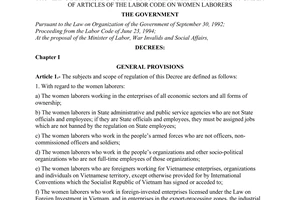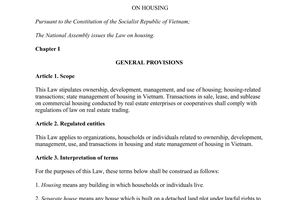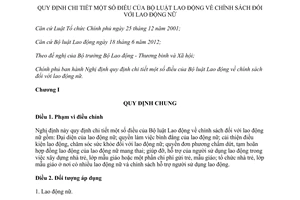Nội dung toàn văn Decree No. 85/2015/ND-CP detailing a number of articles the Labor Code in terms of policies for female employees
|
THE GOVERNMENT |
SOCIALIST REPUBLIC OF VIETNAM |
|
No.: 85/2015/ND-CP |
Hanoi, October 01st, 2015 |
DECREE
DETAILING A NUMBER OF ARTICLES THE LABOR CODE IN TERMS OF POLICIES FOR FEMALE EMPLOYEES
Pursuant to the Law on Government organization dated December 25, 2001;
Pursuant to the Labor Code dated June 18, 2012;
At the request of the Minister of Labor, War Invalids and Social Affairs;
The Government promulgates Decree detailing a number of articles of the Labor Code in terms of policies for female employees.
Chapter I
GENERAL PROVISIONS
Article 1. Governing scope
This Decree details a number of articles of the Labor Code in terms of policies for female employees, including representatives of female employees; female employees’ right to work equally; improvement of working conditions and healthcare services for female employees; right to unilaterally terminate/suspend labor contracts of pregnant employees; employers’ assistance in the establishment of kindergartens/nursery schools or subsidies on the costs of kindergartens/nursery schools; establishment of kindergartens/nursery schools in workplaces where there are many female employees, and policies on subsidies for employers.
Article 2. Regulated entities
1. Female employees.
2. Employers hiring female employees.
3. Other relevant agencies, organizations and individuals.
Article 3. Interpretation of terms
1. Employers hiring lots of female employees are any of the following employers:
a) Employers who hire 10 to 99 female employees where the number of female employees makes up at least 50% of total employees;
b) Employers who hire from 101 to 999 female employees where the number of female employees makes up at least 30% of total employees;
c) Employers who hire at least 1,000 female employees.
2. Places with lots of female employees:
a) Any industrial zones, industrial complexes, processing and exporting zones, economic zones, hi-tech zones (hereinafter referred to as industrial zones) where at least 5,000 female employees working for enterprises who have social insurance in the industrial zone area;
b) Communes, wards and towns where at least 3,000 female employees register for permanent residence or temporary residence.
3. A room for collection and storage of breast-milk is a separate area of at least 6 square meters that is equipped with electricity, refrigerators, tables, chairs and is kept hygienic; tissues or towels, breast pumps and sterilized bottles (if available).
Article 4. Representatives of female employees
A representative of female employees as prescribed in Clause 2 Article 154 of the Labor Code is determined as follows:
1. If an internal trade union has been established, it shall be the representative of female employees;
2. If the internal trade union has not been established, representative of female employees shall be the superior trade union according to the request of female employees. If female employees do not request the representative, the employer shall collect opinions of more than 50% of female employees in the enterprise;
3. The Trade Union specified in Clause 1 and the directly superior Trade Union specified in Clause 2 of this Article shall comply with rights and responsibilities in the collection and reporting of opinions of female employees on issues relating to their rights and interests when the employer requests.
Article 5. Equal rights of female employees to work
1. Rights of female employees to work equally prescribed in Clause 1 Article 153 of the Labor Code is specified as follows:
a) The employer shall ensure equal rights between male employees and female employees in terms of recruitment, assignment, training, wages, awards, promotion, payment of wage and policies on social insurance, medical insurance, unemployment insurance, working conditions, labor safety, working time, rest time and other welfare pertaining to physical and spiritual conditions;
b) The state shall ensure the equality in the fields specified in Point a Clause 1 of this Article in labor relation and policies on preferential treatment and occasional tax reduction.
2. The State shall encourage employers to:
a) Prioritize females in recruitment and assignment if the job is suitable for both males and females and the applicant is qualified;
b) Establish and carry out better policies for female employees than the ones regulated in the laws.
Chapter II
SPECIFIC PROVISIONS
Article 6. Improvement of working conditions for female employees
1. Employers shall ensure that there are sufficient bathrooms and restrooms at working places according to regulations of the Ministry of Health.
2. Employers are encouraged to cooperate with the internal trade union in building up plans and taking measures so that female employees have constant jobs, flexible working schedules including part-time jobs and work-at-home jobs according to reasonable requests of female employees.
Article 7. Healthcare services for female employees
1. When having periodic check-up, female employees will receive maternity-related examination according to the list of maternity-related examination promulgated by the Ministry of Health.
2. During the menstruation, female employees will have time-off as follows:
a) 30 minutes per day for at least 03 days per month;
b) Employees shall be fully paid for such time-off according to the labor contracts;
c) The length of time off shall be agreed by the employees and the employers according to the actual conditions at working place and the need of the employees.
3. During the time of raising infants, female employees will have time-off as follows:
a) 60 minutes per day to breastfeed children, collect and store milk or to take rest;
b) Employees shall be fully paid for such time-off according to the labor contracts.
4. Employers shall build rooms for collecting and storing breast-milk according to the actual conditions of working places and the need of the female employees and capacity of the employers.
5. Employers are encouraged to enable female employees raising infants to collect and store breast-milk at working places. Time off duration shall be agreed by the employees and the employers.
Article 8. Right to unilaterally terminate or suspend labor contract of pregnant employees
1. If a pregnant employee has a confirmation given by a competent medical facility that the continuation of working will impact negatively the embryo, she may unilaterally terminate or suspend the labor contract, provided a prior notice enclosed with the recommendation of the medical facility is submitted to the employer.
2. Deadline for prior notice of unilateral termination/suspension of labor contract shall be according to prescription of the competent medical facility.
3. Regarding the suspension of labor contract, duration of suspension shall be agreed between the employees and the employers supposed but not shorter than the duration recommended by the competent medical facility. If there is no prescription of a competent medical facility about the duration of suspension, the two parties shall negotiate the suspension duration themselves.
Article 9. Assistance of employers in the establishment of kindergartens/nursery schools or subsidies to fees for kindergartens/nursery schools
1. Depending on specific conditions, the employer shall build up plans on assistance, establishment of kindergartens/nursery schools, or provision of subsidies on fees for kindergartens/nursery schools with cashes or items. Level and time of provision of subsidies shall be agreed between the employer and the female employee.
2. Employers are encouraged to establish kindergartens and nursery schools.
Article 10. Establishment of kindergartens and nursery schools at workplaces where there are many female employees
People’s Committees of provinces shall preside over the establishment of kindergartens and nursery schools at workplaces where there are many female employees as follows:
1. Build up planning for establishment of kindergartens/nursery schools when planning or establishing industrial zones according to the laws. If an industrial zone has been finished without planning for kindergartens/nursery schools, an additional planning shall be built up;
2. Establish kindergartens and nursery schools according to demand of female employees;
3. Manage the operation of kindergartens and nursery schools according to the laws;
4. Develop policies to encourage individuals/organizations to invest in the establishment of kindergartens/nursery schools.
Article 11. Supportive policies for employers
1. Any employer who invests in the establishment of kindergartens, nursery schools, medical facilities, cultural works or welfare works conformable to regulations of the Prime Minister in terms of scale and standards shall be entitled to incentive policy for private sector involvement according to current regulations on incentive policies for private sector involvement in the fields of education, vocational training, healthcare, culture, sports and environment.
Any employer who invests in the establishment of housing for employees shall be entitled to preferential policies according to regulations in the Law on Housing.
2. Any employers hiring lots of female employees shall be entitled to the incentives as follows:
a) Such employers are eligible for reduction of enterprise income tax according to law provisions on enterprise income tax;
b) Additional expenses for female employees will be deductible when determining revenues subject to paying enterprise income tax according to regulations of the Ministry of Finance.
Chapter III
ORGANIZATION OF IMPLEMENTATION
Article 12. Organization of implementation
1. Responsibilities of the Ministry of Labor, War Invalids and Social Affairs:
a) Preside over, cooperate with relevant agencies in propagating and disseminating policies applicable to female employees;
b) Conduct inspection of the implementation of this Decree.
2. The Ministry of Finance shall cooperate with relevant Ministries and authorities in guiding People’s Committees of central-affiliated cities and provinces to implement regulations in Article 10 of this Decree.
3. The Ministry of Finance shall cooperate with relevant Ministries and authorities in guiding People’s Committees of central-affiliated cities and provinces to implement regulations in Article 10 of this Decree.
4. Responsibilities of the Ministry of Health:
a) Provide guidance on standards for bathrooms and restrooms prescribed in Clause 1 Article 6 of this Decree;
b) Issue the list of maternity-related items subject to examination prescribed in Clause 1 Article 7 of this Decree;
c) Provide guidance on standards for rooms for collection and storage of breast-milk prescribed in Clause 4 Article 7 of this Decree.
5. Other relevant Ministries and authorities, within their competence, shall cooperate with The Ministry of Education and Training in guiding People’s Committees of central-affiliated cities and provinces to implement regulations in Article 10 of this Decree.
6. Responsibilities of People’s Committees of central-affiliated cities and provinces:
a) Propagate, disseminate and inspect the implementation of policies applicable to female employees specified in this Decree;
b) Review, determine places with lots of female employees and comply with regulations in Article 10 of this Decree.
Article 13. Effect
1. This Decree comes into effect from November 15, 2015.
2. Decree No. 23/CP dated April 18, 1996 by the Government providing details and guidance for the implementation of a number of articles of the Labor Code on female employees is annulled by the effect of this Decree.
Article 14. Responsibilities
Ministers, Heads of ministerial-level agencies, Heads of Governmental agencies, Presidents of People’s Committees of central-affiliated cities and provinces, organizations and individuals that are relevant are responsible for implementing this Decree./.
|
|
ON BEHALF OF THE GOVERNMENT |
------------------------------------------------------------------------------------------------------
This translation is made by LawSoft and
for reference purposes only. Its copyright is owned by LawSoft
and protected under Clause 2, Article 14 of the Law on Intellectual Property.Your comments are always welcomed




